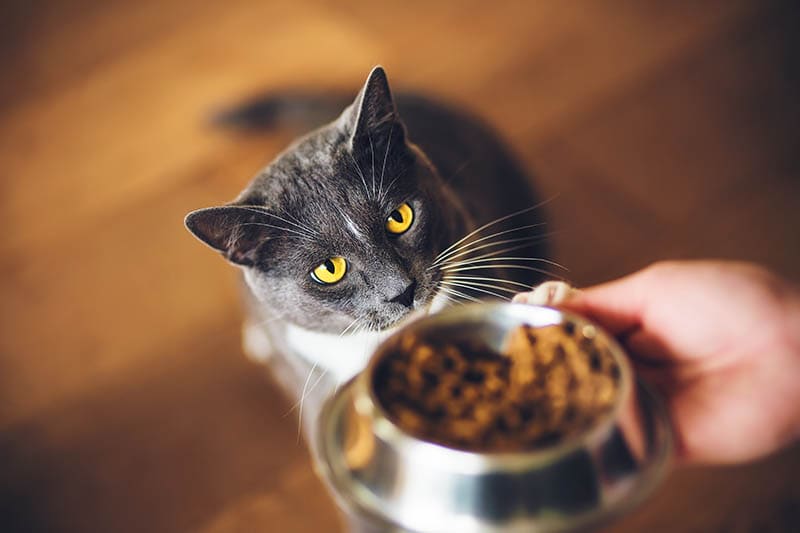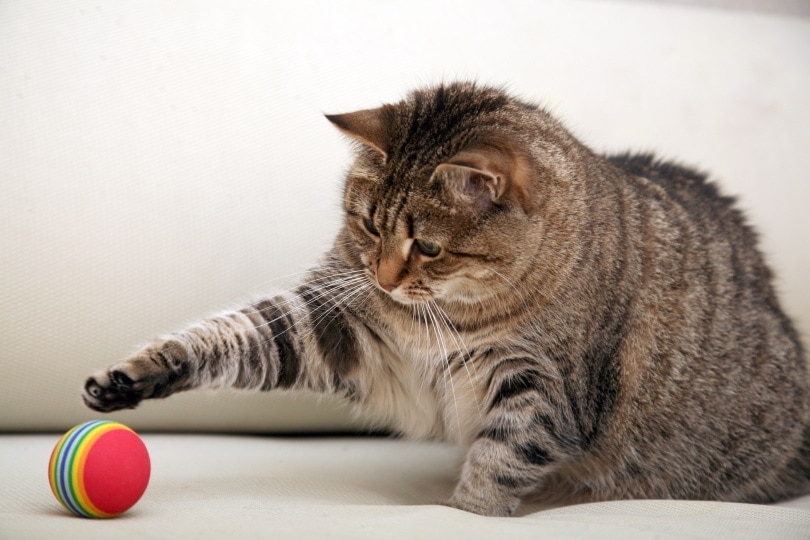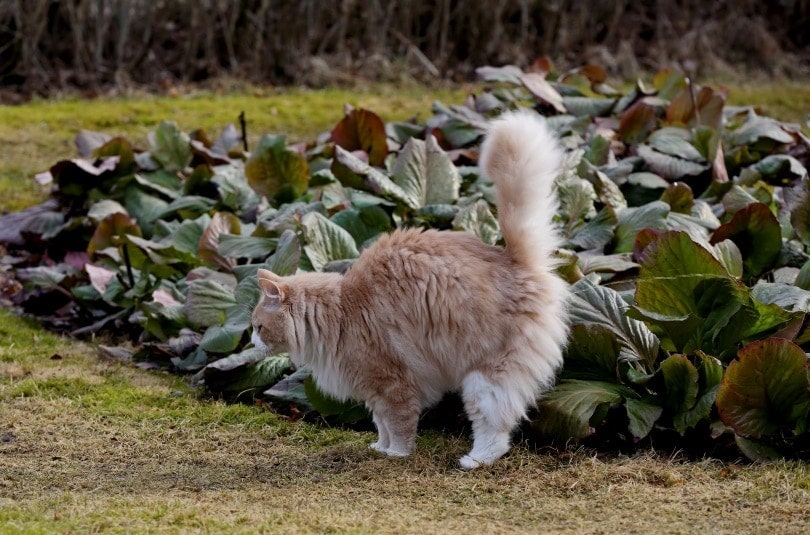Do Cats Feel Remorse or Guilt? Feline Emotions Explained

Updated on
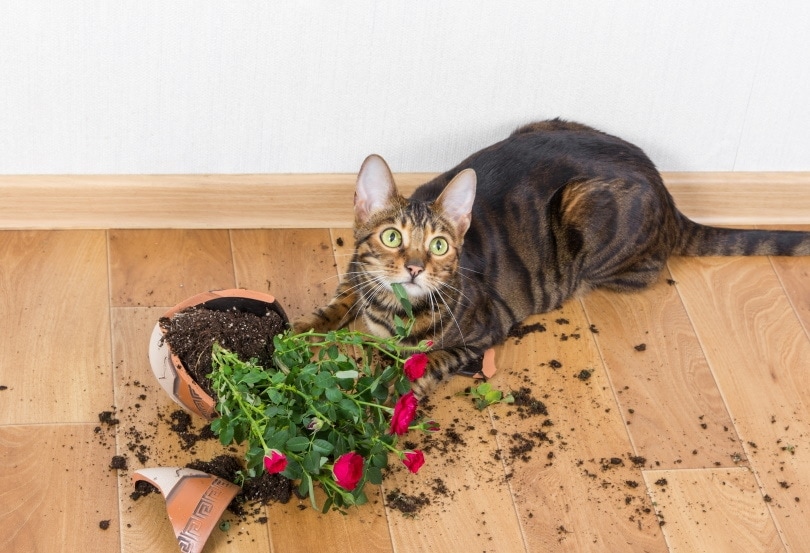
When your cat scratches your favorite chair or urinates outside of the litter box, they may appear to have a guilty look on their face when you express disapproval. Cats are intelligent creatures, but do they feel remorse for their actions? No, they cannot feel guilt, but they’re likely expressing fear when they get a negative reaction from their owners. If you frown and yell, your cat will pick up on your body language and the change in your voice. The kitty will react by flattening its ears or running away, and although it looks like guilt, it’s only a reaction to your heated response.
Feline Emotions
When cats misbehave, their “guilty behavior” is a reaction to your raised voice and actions. If you act calm and do not respond to a damaged chair or wet carpet, your cat will probably not run away or cower in your presence.
Guilt is a human emotion that cats and most animals do not possess. They understand when you’re upset but do not correlate your unhappiness with their behavior. If cats do not display guilt, which emotions do they express?
1. Joy
Cats have a bad reputation for not expressing a lot of emotion, and dog lovers often brag that their pets love them more than cats love their families. Although felines have a subtle way of showing owners how they feel, they’re capable of experiencing and displaying joy.
Rubbing against your legs, purring, light meowing, and face rubbing are signs your cat is happy with you. Some cats may even lick your cheek to show their appreciation. When cats chase a toy around the home or wrestle with another pet, they’re content, and the excited look on their faces may be considered happiness.
2. Fear
Like joy, fear is an emotion that most cat owners can recognize in their pets. When cats are afraid of something, they’ll back away, flatten their ears, and run away to escape the threat. If they’re unable to run, they may respond to a scary event or animal by hunching their back to appear more intimidating and hissing.
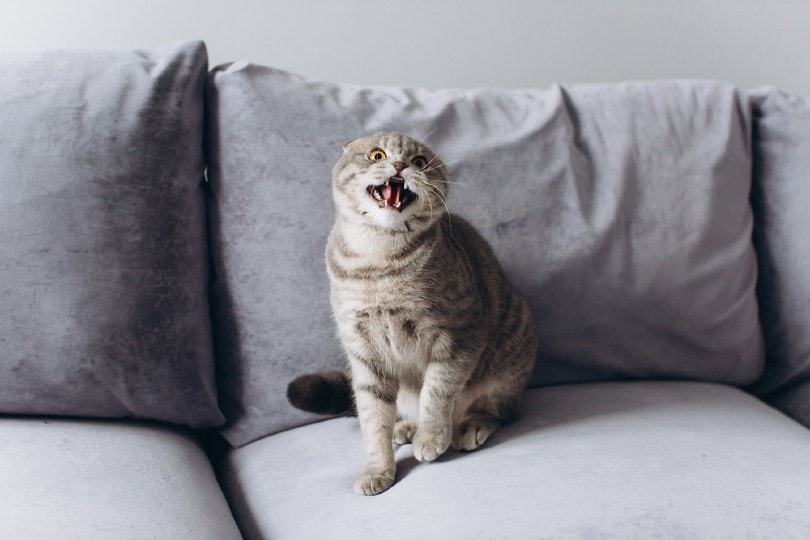
3. Aggression
Aggression can be a problem with two male cats living together who frequently battle for dominance, but the behavior can usually be reduced by having the kitties neutered. When a cat lashes out at a visitor, the problem may be related to territorial aggression. Like dogs, cats are territorial, and some are more aggressive when they think a visitor or other animal is threatening their space.
Although some cats purr when you pet them, some respond with raised claws. Veterinary behaviorists do not fully understand the aggression brought on by petting, but they speculate that some cats are irritated by overstimulation or dislike being petted. If your furball signals that they do not want their fur stroked, it’s best to walk away to avoid a minor injury.
4. Depression
Anxiety and stress can lead to depression, even in cats. Depression can occur for several reasons, but some of the most common causes include moving to a new residence, introducing a new pet or baby, recovering from an injury, or dealing with a noisy remodeling project.
Feline depression is challenging for pet parents to recognize due to the cat’s subtle ways of expressing emotion, but signs to look for in unhappy cats include:
- Reduced grooming that causes a messy coat
- Decreased appetite
- Refraining from physical contact
- Sleeping at odd times
- Refusing to play with toys
If your pet has problems adjusting to a new home or visitor, the depression may subside over time. After an adjustment period, the cat may feel more comfortable in its surroundings.
However, depression can affect the animal’s health, and it’s best to see a veterinarian to ensure the behavior is not related to a medical problem. A depressed cat that’s physically healthy may be prescribed behavioral medications or diet changes to treat the condition.
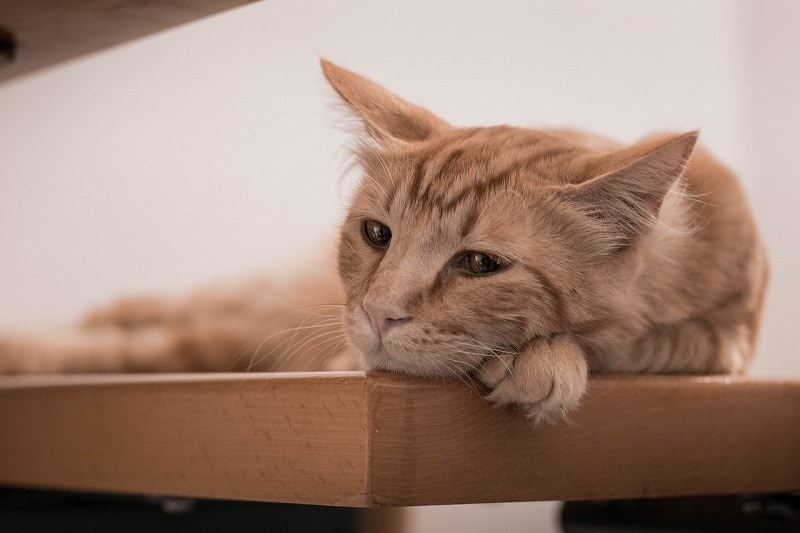
Can Cats Experience Jealousy?
Pet parents with multiple animals roaming around their homes have probably witnessed their pets fighting for their attention, and those with one cat have likely had their cats leap onto their books or laptops. Is jealousy within the realm of feline emotion? Cats sometimes seem to experience jealousy, but these signs are often misinterpreted.
- Marking territory
- Scratching
- Biting
- Hitting objects
- Hissing
- Obstructing your path
According to animal behaviorists, jealousy, or what we perceive as jealousy, is only the cat’s way of displaying its dominance to another person or animal. When you’re petting the dog and your cat lashes out at you or the animal, it’s only telling you that it’s the one that should be receiving your love. When you have other pets, a cat will compete for your attention, but they’re not technically envious of the other animals.
The same is true for cats that jump onto books while you’re reading. Although they may seem to be punishing your book, your cat is trying to get your attention because they feel neglected but do not feel jealous of your reading material. Spending time with your cat and engaging in play sessions every day can alleviate any “jealous” behavior.
Conclusion
Like human psychology, animal psychology is a field that has progressed with new research but still holds several mysteries. More research has been conducted on canine emotions, but feline studies have produced exciting results that dispute the notion that cats are emotionless.
Cats sometimes look guilty when misbehaving, but they only respond to their owner’s reaction to the situation. Cat behavior is often compared to human emotions, but many strange feline actions are instinctual acts of survival. With more research, we may eventually understand what goes on in the mind of a cat.
Related Reads:
- Do Cats Pee When They’re Scared? Deciphering Cat Behavior
- Do Cats Have a Favorite Person? How Do They Choose That Person?
Featured Image Credit: Nataliia Pyzhova, Shutterstock



